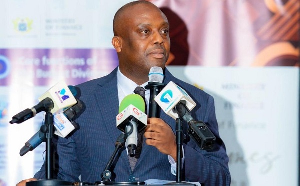ACCRA, May 28 (Reuters) - Ghana's wages commission said on Friday it had approved a 10 percent pay rise for public sector workers and that the potentially inflationary measure would be back-dated to January this year. Falling inflation and a stable currency have since late 2009 given the Bank of Ghana scope to make a total 350 basis points of cuts to bring the prime rate down to 15 percent, with further easing seen dependent on prices staying under control.
George Smith-Graham, chief executive of the Commission, told Reuters the pay rise would apply across the board to Ghana's 470,000 or so public sector workers and complemented a planned reform of the wages structure later this year.
"They will receive the actual salary reflecting the 10 percent (rise) in July but the arrears will be paid in the months of August and September," he said by telephone.
"This is a way of cushioning those public sector workers who may not receive any enhancement under the 'single spine' scheme," he said, referring to the planned new structure. The so-called Single Spine Salary Structure (SSSS) is due from July to put all public sector workers on the same pay scale. It is seen as potentially inflationary because many will see their salary bracket revised upwards. Smith-Graham declined to say how much the pay rise would cost public finances. Ghana's government, which is gearing up for the first revenues from its Jubilee oil field later this year, has been praised for bringing inflation to just under 12 percent. The Bank of Ghana has brought the prime rate down to 15 percent in recent months and has said it could envisage cutting interest rates further as long as inflation kept easing.
UTILITY PRICE HIKES ON HORIZON
"This latest news ... will raise inflation risks somewhat," said Standard Chartered regional head of research Razia Khan, noting it could also prompt the government to claw back revenue by cutting utility price subsidies, itself an inflationary move.
Ghana was also due to announce new utility tariffs later on Friday -- with increases widely expected -- but the announcement was postponed until next week. Kobla Nyaletey, head of liquidity management at Barclays Ghana Treasury, said he believed the measure was compatible with spending already envisaged by the 2010 budget. "There are some challenges ahead though, from probable upward (utility) tariff price adjustments and the implementation of the single spine salary structure," he said. The pace of inflation fell to 11.66 percent in April and is seen dipping into single digits in the next few months before an expected rebound in prices later in 2010. Analysts forecast a further rate cut in June and possibly one more after that.
Bank of Ghana Governor Kwesi Amissah-Arthur told Reuters in a May 14 interview the bank would cut rates further if compatible with the outlook for inflation and growth, which is set to more than double from around six percent this year.
General News of Friday, 28 May 2010
Source: Reuters












